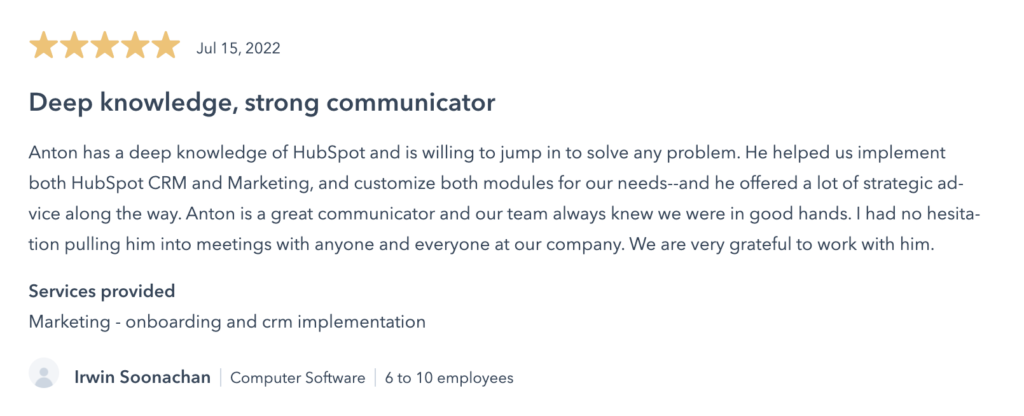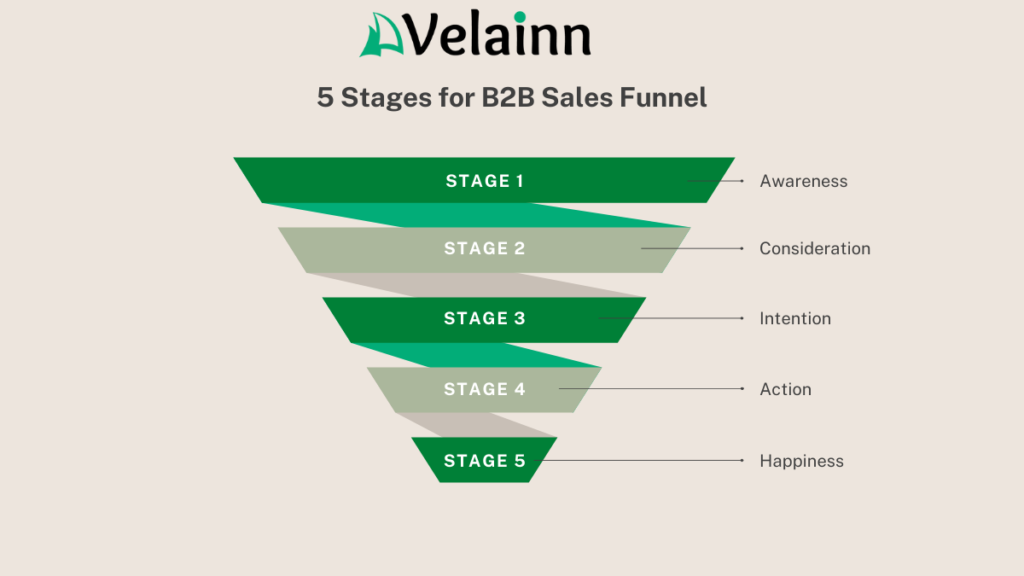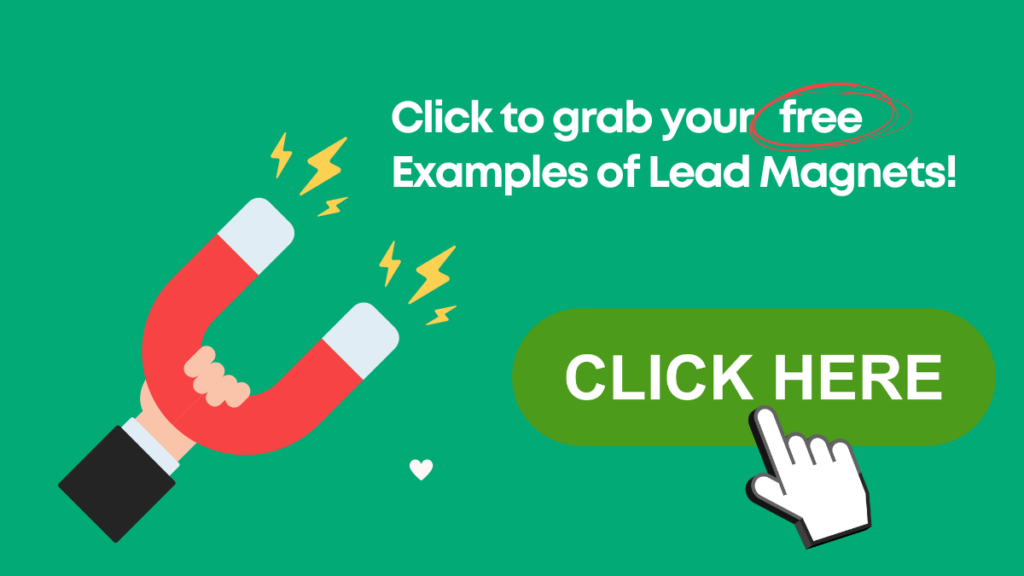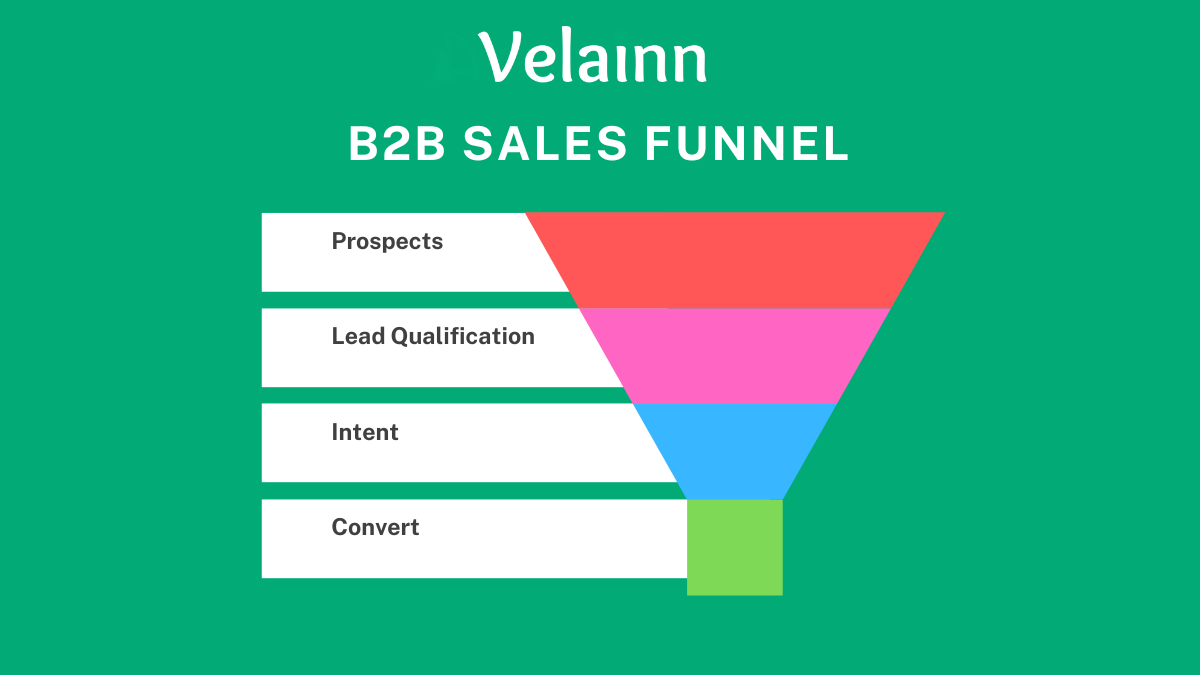Creating a B2B sales funnel is usually challenging because it requires patience, effort, and expertise to make a funnel that converts visitors to leads and turns leads into clients. Even when it appears to be very difficult, the sales journey of your consumer is frequently defined as an organized and consistent procedure.
Many companies use a procedure known as a sales funnel to turn a prospective consumer into a paying customer. A sales funnel begins by gathering fresh leads and continues nurturing them until they convert to clients.
Let’s understand how to create a B2B sales funnel before reviewing some of the top techniques for building a funnel to increase conversions and boost your business’s earnings.
What is a B2B Sales Funnel?
A B2B sales funnel demonstrates to businesses how their clients are engaging with their brand. It outlines the steps people take to become customers and specifies the business activities to be carried out at each stage of the sales funnel.
It’s a pearl of conventional wisdom that you must know who your customer is. Creating a B2B Sales Funnel without understanding the Ideal Customer Profile and having Buyer Personas in advance will be quite hard to achieve high results with any B2B Sales Funnel.
– Although there are many different kinds of sales funnels, they always have the following characteristics:
– Make your customer aware of your company’s products or services through marketing channels.
– Then present your customers with an enticing offer that they can’t refuse and start establishing initial contact with your company’s
– You should use several follow-up procedures to encourage your clients to purchase after the initial contact.
How does the B2B Sales Funnel differ from the B2C Sales Funnel?
Although B2B and B2C sales funnels sometimes have identical stages and functions, they usually differ in terms of sales cycle and number of stages.
While B2C Funnel is usually a faster way to make sales, especially when speaking about non-expensive goods, B2B Sales Funnel is a longer way to push your target audience into a decision. The B2B Sales Funnel must consider different persons in a company who make decisions and impact the decision-makers.
While individuals in B2C can make a decision quickly and buy something from you, B2B persons, as they are members of companies, usually have to think of their options to buy more precisely and then discuss them with their partners or others who can make a decision to buy.
You can look at a B2B sales funnel from both the customer’s and the company’s perspective.
B2B Sales Funnel stages from a customer’s perspective
Putting yourself in the shoes of a customer allows you to see that the classic B2B sales funnel has the following 5 stages:
1. Awareness – define the problem that your target audience has.
In this stage, you show the prospect that they have a problem. Sometimes, people in companies don’t know they have a problem, but that’s true. They also have to understand that this problem can be resolved. A good example is employee attrition, which one of our clients resolves by providing software to calculate employee attrition and suggest how to take action before an employee retires. After a company realises they have a problem – “Not controlling enough employees’ attrition”, they will go to the next stage. BTW, below you can see the review of our work for Praisidio:

2. Consideration – companies look for solutions and compare them
Now Prospects have realised that they have a problem, and they will start searching for possible solutions. Potential consumers will be curious about what is offered on the market. So they’ll start investigating your business and/or a concrete proposal and compare it to other businesses. At this stage, companies might check price, various reviews about service and support teams, quality of products, delivery schedules, and more.
3. Intention – your company seems to be a good fit
This stage starts when a company intends to buy your products or services. This stage mostly comes when a client has considered your company an excellent fit to resolve their problem and is now looking for means to make a purchase or talk to your sales team.
At this stage, the client’s ambiguity clears. The intention is when a customer has already decided to purchase something from you but wants some assistance selecting the best good or service.
4. Action – the conversion is happening.
Congrats! The action comes as the last stage. This occurs when a prospect has made up their mind to purchase the goods or services and has taken some action. Usually, it’s closing a deal, signing a retainer agreement, buying a SaaS Product, etc.
5. Happiness
When speaking about B2B, companies must be sure that they can contact the vendor if they have any questions, encounter software bugs, or need further assistance.

How to create a B2B Sales Funnel?
Also, in B2B, the target audience is people – employees, founders, investors of companies. So, please know who your audience is, and not only information about a target company but also about their people.
A good B2B sales funnel will have a direct route leading from the first point of contact to the final transaction.
If you need help with defining Buyer Personas and Ideal Customer Profiles, as well as creating a whole B2B Sales Funnel, schedule a free consultation with me.
The following steps help you create an effective B2B sales funnel:
1. Set up your goals
Before working out your B2B Sales Funnel, remember to define goals. These can include pushing your target audience to make a purchase, leave important information via form, attend a webinar, and more.
It’s crucial to concentrate on a specific goal when creating a B2B sales funnel. This will enable you or your team to consider one or two main problems of your target audience and provide them with specific content that will attract them.
2. Create a Lead Generation Magnet
Think of a value that you can provide to your Buyer Persona. Then, include this value in a lead magnet. A lead magnet is a perceived value for your target audience that is proposed for free in exchange for their contact information.
The goal of Lead Magnet is to be allowed to contact your buyer personas afterward and know more information about them. Some examples of lead magnets are below:
– Free Training in YouTube
– Free trials to attract people to use your software
– Webinars
– eBooks
– White papers
– Various discounts
– Free demo of your software or service
And others

Usually, Lead Magnets can be done separately and placed on Landing Pages, pages with the highest number of visitors, or Social Networks. Then, if you don’t have enough organic, social, or referral traffic, they're usually promoted by ads.
In my opinion, the best software for this is HubSpot. Velainn is a Certified HubSpot Solution Provider, and we enjoy creating Lead Magnets for our B2B Clients. Schedule a free consultation if you’re interested in learning more.
BTW, a Free Consultation is a Lead Magnet:)
3. Qualify Leads
After leads have left their information, you should qualify them based on a ready-made qualification process. Not all Companies can be qualified as potential clients. For example, your clients (Companies) might have a concrete geolocation, a specific minimum budget, a specific industry, and so on.
Partly, the qualification should be done in the previous phase when creating ads and content, though each lead has to pass the qualification stage anyway so that you don’t waste your time or the time of your sales department afterwards.
Keep an eye on your team’s real performance. There are several approaches to this, but you must choose one that fits you and your group. Tracking the number of leads produced, the number of meetings scheduled, or the number of sales concluded are a few examples of monitoring techniques.
4. Nurture qualified Leads
The key to developing a B2B sales funnel is to foster communication at every stage. Social networking, email, and telephone calls are examples of this. The goal is to engage the consumer in conversation so they may learn more about your company’s products/services. And also gain more trust.
A targeted and contextual email campaign can be a good option here.
A firm's success depends on understanding the customer’s purchase process. Conversations are very important when you want to have long-term B2B clients.
5. Set up your support and communication properly
After a purchase is made, the customer journey continues because you must ensure that all your clients (company members) are happy with your product and service. Based on what you sell or provide, to have a long-term relationship, you should provide all necessary support, resolve issues, and answer questions ASAP so that your clients are delighted and want to work with you long term.
So, get ready to contact your clients if needed. Your sales and/or support team must also be ready for any upcoming questions or concerns.
Conclusion
Making sales is the primary goal of a company. The B2B sales funnel is a comprehensive manual on how your company generates leads and closes deals. Although you won’t convert every prospect, even tiny increases in your conversion rate can significantly impact your organization. An effective B2B sales funnel is a nice way to increase customer conversion rates and gain new B2B clients.
Get in touch with Velainn or schedule a free consultation, if you’re looking to improve your B2B Sales funnel and generate more revenue.

